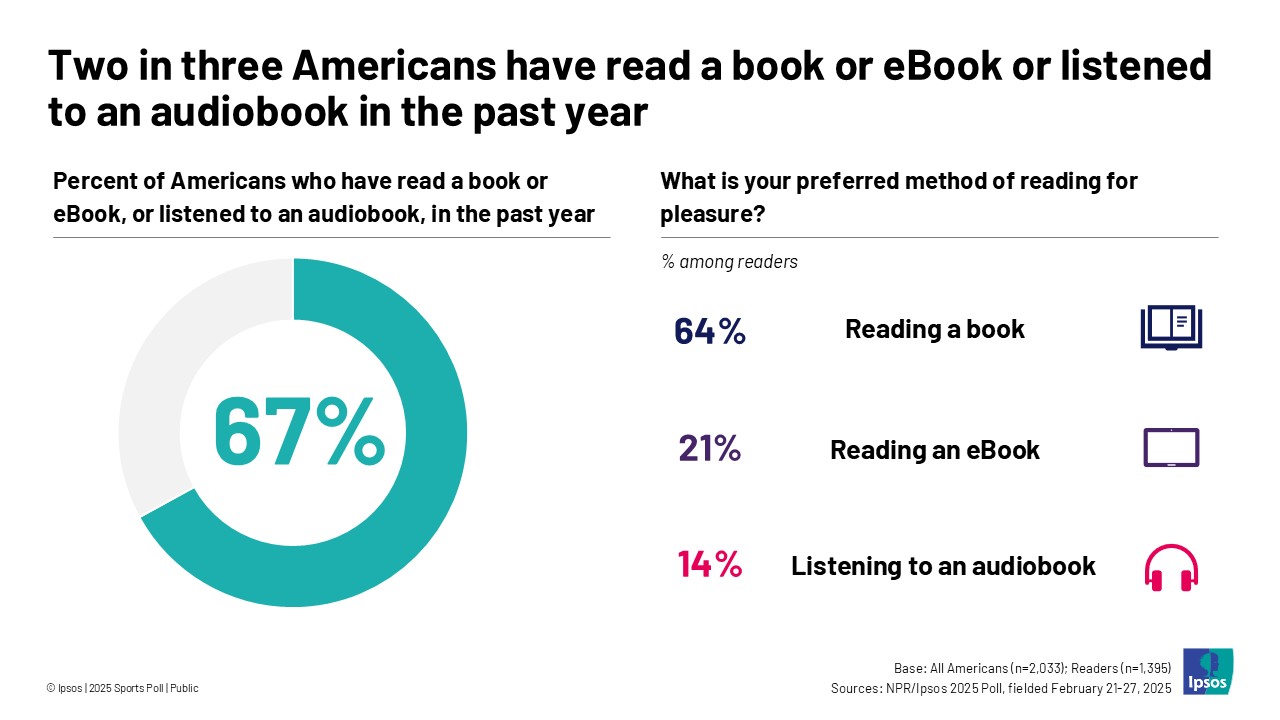Most Americans read, but it's not our priority leisure activity
Washington, DC, April 4, 2025 - A new NPR/Ipsos poll finds that two in three Americans are readers, defined as those that have read a book or an eBook, or listened to an audiobook in the past month. Half have read a book or an eBook in the past month, and one in six have listened to an audiobook. Americans largely hold positive opinions about reading, but a sizeable minority say it is not a priority for them, and the most common reason for not reading more is not having enough time because of other life activities.
The poll also finds that, while few Americans set a reading goal last year, a majority have expressed a desire to become better readers. Lastly, nearly all parents agree that they want their children to develop a love of reading, and majority of those with school-aged children report that their children both have an interest in reading and read for pleasure.
For more information, please see NPR's story here: https://www.npr.org/2025/04/07/nx-s1-5333652/books-reading-poll

Detailed Findings
- Two in three Americans report reading a book or eBook, or listening to an audiobook, in the past year. However, there is some debate about what constitutes reading; two in five Americans feel that listening to audiobooks is not a form of reading.
- Fifty one percent say they have read a book or an eBook in the past month. Women (56%) are more likely than men (45%) to have done so.
- Sixteen percent of Americans have listened to an audiobook in the past month. Those ages 18-34 (21%) and 35-54 (18%) are more likely than their older counterparts to report listening to audiobooks. Additionally, parents (22%) are more likely than non-parents (15%) to have done so.
- Among readers, a majority say that reading a book (64%) is their preferred method of reading. This is followed by reading an eBook (21%) and listening to an audiobook (14%).
- Along these lines, two in five Americans and readers (41% each) agree that audiobooks are not a form of reading.
- Americans believe reading is a way to learn about the world and relaxing. However, two in five also say that it is low on their priority list.
- A strong majority of Americans (82%) and readers (88%) agree that reading is a way to learn about the world. A majority of both also believe that reading is relaxing (76% and 92%, respectively).
- Similarly, two in three Americans report wanting to keep a collection of books in their home. Nearly four in five readers (79%) share this sentiment.
- Despite holding these positive opinions about reading, 43% of Americans agree that reading is low on their priorities list.
- In the same vein, when asked why they don’t read more, the top selected reason is not having enough time because of other life activities (43%). Second tier reasons include preferring other forms of entertainment (43%), not having enough time because of work (25%), and having trouble focusing while reading (22%).
- Few Americans set a reading goal last year. However, a majority express a desire to become better readers.
- Just 14% of Americans and 18% of readers set a reading goal in the past year. Even fewer (9% and 13%, respectively) met or exceeded reading goal.
- Of note, Americans under age 35 were more likely to have set a goal (21%).
- Despite not setting a reading goal, 63% of Americans and 71% of readers agree that they want to become better readers. Americans under age 35 (71%) are significantly more likely than their older counterparts to hold this sentiment.
- A majority of readers get their book inspirations from friends or family.
- Fifty-five percent of readers report getting their inspiration on what books to read or listen to from friends or family.
- Second tier places include local libraries (28%), social media (25%), online retailers (24%), brick and mortar bookstores (24%), and book reviews from media sources (22%). Of note, readers under 50 are more likely to say social media.
- The most popular book genre among readers is thriller/crime/mystery (37%), followed by non-fiction (24%), biography (21%), historical fiction (21%), fantasy (20%).
- Nearly all parents want their children to develop a love of reading, and a majority of those with school-aged children say that their child is interested in reading.
- Ninety-eight percent of parents agree that they want their children to develop of love of reading.
- Nearly four in five (79%) parents with school-aged children say that their child is interested in reading. Slightly fewer, but a strong majority nonetheless, say that their child chooses to read for pleasure and that they use books to bond with their child (69% each).
- A majority of parents with school-aged children report that their child’s school has mandatory reading during the school year (73%) and sets time aside during the school day for reading (54%), and 42% say that there are mandatory book reports during the school year.
- However, significantly fewer report that their child’s school has mandatory reading (31%) or book reports (17%) during the summer.
- Lastly, half of parents with school-aged children say that their child has a short attention span, and 44% are concerned that the COVID-19 pandemic caused their child to lose valuable learning time.
About the Study
This NPR/Ipsos was conducted February 21 to February 27, 2025, by Ipsos using the probability-based KnowledgePanel®. This poll is based on a nationally representative probability sample of 2,033 adults age 18 or older. The sample also includes 1,395 readers, defined as those who have read a book or listened to an audiobook in the past year.
The survey was conducted using KnowledgePanel, the largest and most well-established online probability-based panel that is representative of the adult US population. Our recruitment process employs a scientifically developed addressed-based sampling methodology using the latest Delivery Sequence File of the USPS – a database with full coverage of all delivery points in the US. Households invited to join the panel are randomly selected from all available households in the U.S. Persons in the sampled households are invited to join and participate in the panel. Those selected who do not already have internet access are provided a tablet and internet connection at no cost to the panel member. Those who join the panel and who are selected to participate in a survey are sent a unique password-protected log-in used to complete surveys online. As a result of our recruitment and sampling methodologies, samples from KnowledgePanel cover all households regardless of their phone or internet status and findings can be reported with a margin of sampling error and projected to the general population.
The study was conducted in English. The data for the total sample were weighted to adjust for gender by age, race/ethnicity, education, Census region, metropolitan status, and household income. The demographic benchmarks came from the 2024 March Supplement of the Current Population Survey (CPS).
- Gender (Male, Female) by Age (18–29, 30–44, 45-59 and 60+)
- Race/Hispanic Ethnicity (White Non-Hispanic, Black Non-Hispanic, Other, Non-Hispanic, Hispanic, 2+ Races, Non-Hispanic)
- Education (Less than High School, High School, Some College, Bachelor or higher)
- Census Region (Northeast, Midwest, South, West)
- Metropolitan status (Metro, non-Metro)
- Household Income (Under $25,000, $25,000-$49,999, $50,000-$74,999, $75,000-$99,999, $100,000-$149,999, $150,000+)
The margin of sampling error is plus or minus 2.3 percentage points at the 95% confidence level, for results based on the entire sample of adults. The margin of sampling error takes into account the design effect, which was 1.09. For readers, the margin of sampling error is 2.7 and the design effect is 1.09. The margin of sampling error is higher and varies for results based on sub-samples. Sampling error is only one potential source of error. There may be other unmeasured non-sampling error in this or any poll. In our reporting of the findings, percentage points are rounded off to the nearest whole number. As a result, percentages in a given table column may total slightly higher or lower than 100%. In questions that permit multiple responses, columns may total substantially more than 100%, depending on the number of different responses offered by each respondent.
About Ipsos
Ipsos is one of the largest market research and polling companies globally, operating in 90 markets and employing over 18,000 people.
Our passionately curious research professionals, analysts and scientists have built unique multi-specialist capabilities that provide true understanding and powerful insights into the actions, opinions and motivations of citizens, consumers, patients, customers or employees. Our 75 solutions are based on primary data from our surveys, social media monitoring, and qualitative or observational techniques.
Our tagline "Game Changers" sums up our ambition to help our 5,000 customers move confidently through a rapidly changing world.
Founded in France in 1975, Ipsos has been listed on the Euronext Paris since July 1, 1999. The company is part of the SBF 120 and Mid-60 indices and is eligible for the Deferred Settlement Service (SRD).
ISIN code FR0000073298, Reuters ISOS.PA, Bloomberg IPS:FP www.ipsos.com



